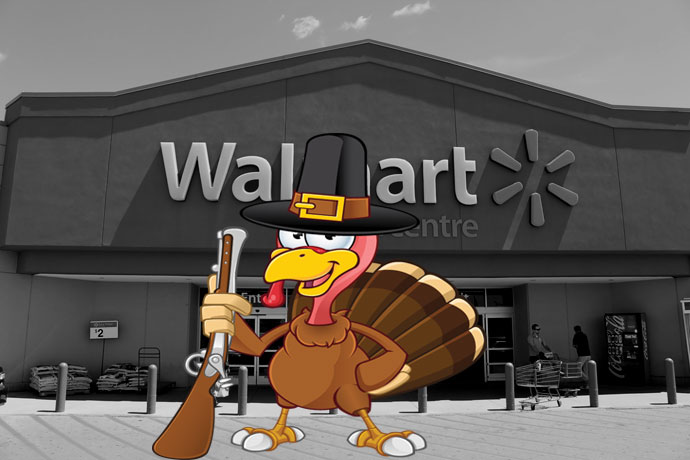Corporate America Has Stolen Thanksgiving
Get ready for more change this holiday season. People will now be doing their shopping even earlier on Thanksgiving Day, in large part because corporations are telling them they can.
The day after Thanksgiving, known as Black Friday, has long been the biggest retail shopping day of the year, and corporations are eager to make sure they rake in as much money as they can. Their solution seems to be to open their stores earlier each year to compete with other stores doing the same.
Major retailers like Macy’s, Best Buy and Target are opening their doors as early as 6 p.m. on Thanksgiving, hours earlier than openings last year. Walmart’s in the mix too, of course. Many Walmart stores are open 24 hours regardless of holidays, so to make Thanksgiving special, the stores are starting sales events at 6 p.m. and 8 p.m.
What This Means For Families
For thrifty families that just can’t resist a good sale, earlier store openings could mean the end of a traditional Thanksgiving dinner.
Keep in mind that a 6 p.m. opening often means people will be waiting outside the store for hours beforehand. Family members might as well say to each other, “I’d rather spend money on you than spend time with you.”
And the numbers reflect this. Only 79 percent of people will be attending a Thanksgiving celebration this year, down 6 percentage points from last year.
This might be an oversimplification. There are likely families that have worked it out. Thanksgiving lunch, perhaps, or maybe Thanksgiving dinner out of Tupperware while the family camps outside Best Buy together.
Whatever the circumstances, people are now very much factoring shopping into their Thanksgiving Day plans. The National Retail Federation reported that 28 percent of shoppers were in stores last Thanksgiving.
Most predictions estimate that significantly more people will hit stores this year. One recent survey by Accenture found that 38 percent of shoppers plan to take advantage of this year’s Thanksgiving deals.
What This Means For Retail Workers
Shopping on Thanksgiving Day is a choice, but working may not be. Millions of retail workers will be clocking in this year, with little or no choice in the matter. Walmart alone will have more than 1 million workers in stores on turkey day.
Some stores try to ease the pain by paying time and a half or more, providing free meals, or offering additional employee discounts. Many workers are enticed by the perks and volunteer to work on the holiday in order to pick up some extra cash. For example, more than 90 percent of Macy’s Thanksgiving Day workers will be there voluntarily, according to Jim Sluzewski, the senior vice president of corporate communications and external affairs.
Most, however, still see Thanksgiving as a day meant for family and rest. And let’s not forget: working on Thanksgiving and Black Friday has proven to be dangerous or even deadly in some cases of overzealous shopping crowds.
The most prominent example of this happened in 2008 at a Long Island Walmart. The incident involved more than 2,000 shoppers literally breaking down the doors and stampeding the store before it was set to open. The crowd trampled one seasonal employee, 34-year-old Jdimytai Damour, who died an hour later from his injuries.
Other incidents surrounding Black Friday have involved pepper spray, deadly gunfire and even a miscarriage as a result of a stampede of shoppers.
With Black Friday shopping beginning earlier each year, we shouldn’t be surprised by reports of shopping-related injuries or deaths on Thanksgiving.
Curbing The Negative Effects Of Early Shopping
Lawmakers are starting to realize all the negative impacts of corporate America’s link to Thanksgiving weekend, and they have half a mind to do something about it.
Mike Foley, an Ohio state representative, plans to spearhead a campaign to alter stores’ priorities on the all-American holiday. He plans to introduce a bill to the Ohio House of Representatives that would require stores to pay employees triple time for any hours worked Thanksgiving Day. It would also prevent stores from retaliating against employees who refuse to work that day.
Foley believes added payroll expenses would make stores reconsider opening on Thanksgiving.
The bill “would matter in a huge way,” said John Talbott, associate director at Indiana University’s Center for Education and Research in Retailing. The retail expert went on the explain that payroll costs are often the top expense for retailers, and that drastically increasing such costs would act as a deterrent.
Foley knows many stores would still open, and he hopes that additional measures would result in happier workers and better treatment. “I don’t know that I can go in and say you can’t work on Thanksgiving, but the people who have to put up with all the chaos and the frenzy should be paid more,” he said.
Foley doesn’t necessarily expect his bill to pass. After all, he’s a Democrat in a largely Republican body. He does hope, however, that the bill will stir the pot and start conversations about consumerism and workers’ treatment on Thanksgiving.
For now, consumerism will remain a largely individual choice.
If you’re unhappy about corporations taking over turkey day, the best thing you can do is simply avoid shopping on Thanksgiving weekend. You can still shop online, and you’ll have plenty of time to visit stores in person in December. You might not get the doorbuster discounts, but you’ll still be able to find plenty of savings. Plus, you’ll be shopping without the stress of massive crowds or the disappointment of missing Thanksgiving dinner with your family.
































